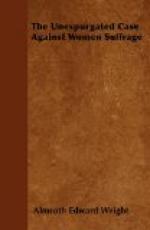The compromise which ordinary human nature had fixed upon—and it is one which, ministering as it does to the survival of the race, has been adopted through the whole range of nature—is that of making within the world in which violence rules a series of enclaves in which the application of violence is progressively restricted and limited.
Outside the outermost of the series of ring fences thus constituted would be the realm of uncompromising violence such as exists when human life is endangered by wild animals, or murderous criminals, or savages. Just within this outermost fence would be civilised war—for in civilised war non-combatants and prisoners and wounded are excluded from the application of violence. In like manner we bring humanity in general within a more sheltered enclosure than animals—pet animals within a more sheltered enclosure than other animals. Again, we bring those who belong to the white race within a narrower protecting circle than mankind in general, and those of our own nation within a still narrower one.
Following out the same principle, we include women and children within a narrower shelter fence than our adult fellow-male; and we use the weapon of force more reluctantly when we are dealing with our relatives and friends than when we are dealing with those who are not personally known to us; and finally, we lay it aside more completely when we are dealing with the women of our households than when we are dealing with the males.
The cause of civilisation and of the amenities, and the welfare of the nation, of the family, and of woman, are all intimately bound up with a faithful adherence to this compromise.
But this policy imposes upon those whom it shelters from violence corresponding obligations.
In war non-combatants—not to speak of the wounded on the battlefield—must desist from hostile action on the pain of being shot down like wild beasts. And though an individual non-combatant might think it a patriotic action for him to take part in war, the thoughtful man would recognise that such action was a violation of a well-understood covenant made in the interest of civilisation, and that to break through this covenant was to abrogate a humanitarian arrangement by which the general body of non-combatants immensely benefits.
Exactly the same principle finds, as already pointed out, application when a woman employs direct violence, or aspires to exercise by voting indirect violence.
One always wonders if the suffragist appreciates all that woman stands to lose and all that she imperils by resort to physical force. One ought not to have to tell her that, if she had to fight for her position, her status would be that which is assigned to her among the Kaffirs—not that which civilised man concedes to her.
>From considering the compromise by which man adapts his dual nature to violence in the world, we turn to that which the female legislative reformer would seek to impose by the aid of her vote.




